
Morung Express News
Dimapur | November 24
“A successful paradigm can be forged when Naga institutions move beyond sectarian mentalities and invest in relationships of cooperation.”
Rev. Dr. Wati Aier has stood his ground on these thoughts for years; he reiterated them today while delivering the Chalie Kevichusa Memorial Lecture 2018 at the DBIDL Hall, Don Bosco Campus, here today.
Crediting the late Chalie Kevichusa with being “one among a handful of lucid and luminous individuals invested in safeguarding Naga rights,” Dr. Wati’s lecture today was titled ‘Beyond Tribal Seduction: A Personal Reflection.’ “Tribalism lurks as a notorious seducer of community… a tool of self-exclusion and communal division and can too easily be used to incite one against the other,” he observed.
CLICK HERE
Beyond Tribal Seduction: A Personal Reflection
“Social iconoclasts,” or public leaders, have used this as “double-edged means” to “seduce the public for numerous means and ends, often at the expense of the public’s chance to act generously for the common belonging.” This, according to Dr. Wati, has trapped the people in narrow definitions and singular perspectives.
He gave greater sanction to Naga pioneers of the early 20th century who “knew that the meaning of independence in our context lay in protecting and preserving our common identity (the overarching Naga nation).”
Acknowledging the contribution of Dr. AZ Phizo, for instance, in “meeting every Naga nation and constructing the pan-Naga identity and movement,” Dr. Wati maintained that “the de-constructionist malignancy of the tribe is one of the reasons for our present socio-politico-theological fragmentation and hostility.”
This tendency, he said, is prevalent not just among the various Naga nations but also Naga national groups with their “hegemonic attitude towards Naga nationalism” apart from “tired patterns of reactive justifications and defensive reactions.”
For once, he asked, can we truly say “forgive me, I have made a mistake and I ask for forgiveness from God and my brothers and sisters”?
Thus, “the politics of divide and limit and subtle domestication has only led to one group scapegoating the other, and has only fanned the flames of mistrust and violence.”
To rise above this, Dr. Wati called for the Naga imagination to conjure “creative energy” and “forge an alternate history” that “rises above the prevalent defeatist frames of our cultural ethos.”
“It is the history of common belonging, and a history constructively woven into an identity called ‘Naga’ that is spread across lands beyond the present state of Nagaland,” he illuminated.
And this can be constructed when “Nagas who remain aware of the sacredness of Naga history vigilantly safeguard against the desperate rationalization of any bedrock.” This can be constructed when “Clearing the air of fear, mistrust, and all stereotypes, Naga institutions and citizens scale higher planes in inter-relationships… the relationships of cooperation.”
While asserting that “the idea of relationships of cooperation does not mean that the Naga groups will mitigate or diminish their institutional responsibilities and obliterate themselves,” Dr. Wati asserted that “A successful paradigm can be forged when Naga institutions move beyond sectarian mentalities and invest in relationships of cooperation. Only then will we witness a heightened awareness of our respective obligations as Naga institutions and as intelligent, responsible citizens.”
Hosted by the Kevichusa Foundation, the program also saw the presentation of the A. Kevichusa Citizenship Award.





